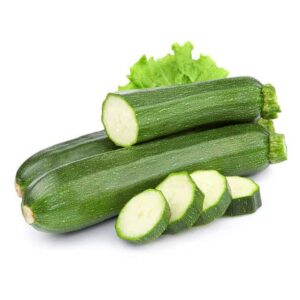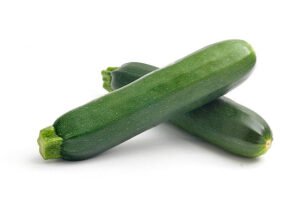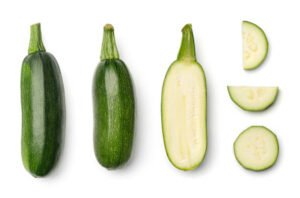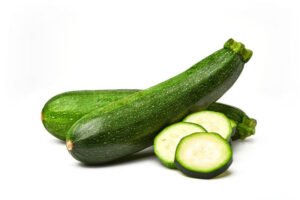Zucchini, also known as courgette, is a versatile and nutritious vegetable that offers numerous health benefits. Packed with essential nutrients, zucchini can be a valuable addition to a balanced diet. Let’s explore the science-backed benefits of consuming zucchini.
 Rich in Antioxidants
Rich in Antioxidants
Zucchini contains antioxidants like vitamin C, vitamin A, and various phytonutrients. These antioxidants help combat oxidative stress, reduce inflammation, and protect the body against chronic diseases. Regular consumption of zucchini can contribute to overall cellular health and support a strong immune system.
Additionally, zucchini is particularly abundant in compounds like lutein and zeaxanthin, which are crucial for maintaining eye health. These antioxidants play a vital role in filtering harmful high-energy blue wavelengths of light and protecting the eyes from oxidative damage caused by free radicals. Regular consumption of zucchini can thus contribute to preserving vision and reducing the risk of age-related macular degeneration.
Moreover, the presence of carotenoids such as beta-carotene in zucchini provides further antioxidant benefits. Beta-carotene is converted into vitamin A in the body, supporting healthy skin, promoting cell growth, and aiding in proper immune function. The combination of various antioxidants in zucchini not only helps in neutralizing free radicals but also promotes skin regeneration, contributing to a youthful complexion and overall skin health.
 Weight Management
Weight Management
If you’re aiming to maintain a healthy weight, zucchini can be a great ally. With its high water content and low calorie count, zucchini provides satiety without adding excessive calories to your diet. Additionally, the fiber content in zucchini aids in digestion, promotes feelings of fullness, and supports healthy weight management.
Moreover, zucchini is rich in vitamins and minerals, including vitamin C, vitamin A, potassium, and folate, which are essential for overall health and well-being. These nutrients support various bodily functions, including metabolism, energy production, and immune system function. By incorporating zucchini into your diet, you can ensure that you’re getting vital nutrients without compromising your weight management goals.
Another benefit of zucchini is its low glycemic index (GI), which means it has a minimal impact on blood sugar levels. This feature is particularly advantageous for individuals concerned about managing their blood sugar levels, such as those with diabetes or insulin resistance. By choosing low-GI foods like zucchini, individuals can better regulate their blood sugar levels and support overall health.
 Heart Health
Heart Health
Zucchini is a heart-friendly vegetable due to its rich potassium and magnesium content. These minerals help regulate blood pressure levels, maintain proper heart rhythm, and support cardiovascular health. The dietary fiber in zucchini also plays a role in managing cholesterol levels and reducing the risk of heart disease.
Additionally, zucchini contains significant amounts of antioxidants like vitamin C and beta-carotene, which help prevent oxidative stress and inflammation in the cardiovascular system. These antioxidants work to protect the heart from damage caused by free radicals, reducing the risk of developing conditions such as atherosclerosis and coronary artery disease.
Moreover, the high water content in zucchini contributes to overall hydration, which is essential for maintaining optimal blood volume and circulation. Proper hydration supports the heart in pumping blood efficiently throughout the body, reducing the strain on the cardiovascular system and lowering the risk of hypertension.
 Digestive Health
Digestive Health
Zucchini is a good source of dietary fiber, which is essential for a healthy digestive system. Fiber promotes regular bowel movements, prevents constipation, and supports the growth of beneficial gut bacteria. Including zucchini in your diet can contribute to a well-functioning digestive tract and optimal nutrient absorption.
Zucchini is particularly beneficial for digestive health due to its high water content. With about 95% water, zucchini helps keep the digestive system hydrated, aiding in the smooth movement of food through the digestive tract. This hydration aspect is crucial for preventing conditions like constipation, as adequate water intake is essential for softening stools and facilitating their passage.
Moreover, zucchini is a low-calorie vegetable, making it a great choice for those aiming to maintain a healthy weight, which is another aspect linked to digestive wellness. By incorporating zucchini into your meals, you can increase your vegetable intake without significantly increasing calorie consumption. This not only supports digestive health by providing essential nutrients but also helps in weight management, reducing the risk of obesity-related digestive issues such as acid reflux, gallstones, and diverticulitis.
Furthermore, the presence of antioxidants like vitamin C and vitamin A in zucchini contributes to its digestive benefits. These antioxidants help in reducing inflammation in the digestive tract, protecting it from oxidative stress and damage. Additionally, zucchini contains significant amounts of potassium, which aids in maintaining proper muscle function, including the muscles involved in digestion and bowel movements.
 Eye Health
Eye Health
Zucchini contains antioxidants such as lutein and zeaxanthin, which are crucial for maintaining good eye health. These compounds protect the eyes from harmful free radicals, reduce the risk of age-related macular degeneration, and promote overall vision. Regular consumption of zucchini can support long-term eye health and protect against vision problems.
Additionally, zucchini is a rich source of vitamin C, which plays a vital role in maintaining the health of blood vessels in the eyes and reducing the risk of cataracts. Its high water content also contributes to keeping the eyes hydrated, preventing dryness and irritation that can lead to discomfort and impaired vision. Moreover, zucchini is low in calories and packed with nutrients like vitamin A, essential for preserving night vision and preventing conditions like night blindness.
Furthermore, the presence of dietary fiber in zucchini supports healthy digestion and helps regulate blood sugar levels, indirectly benefiting eye health. Stable blood sugar levels are essential for preventing diabetic retinopathy, a condition that can lead to vision loss in individuals with diabetes.
 Anti-Inflammatory Properties
Anti-Inflammatory Properties
Zucchini contains phytonutrients and antioxidants that possess anti-inflammatory properties. These compounds help reduce inflammation in the body, which is linked to various chronic diseases, including cardiovascular disease, arthritis, and certain types of cancer. Regular consumption of zucchini can contribute to maintaining a healthy inflammatory response.
Additionally, zucchini contains high levels of vitamins A and C, which act as potent antioxidants, further bolstering its anti-inflammatory effects. These vitamins work synergistically with the phytonutrients present in zucchini to neutralize harmful free radicals in the body, thereby reducing oxidative stress and inflammation.
Furthermore, the unique combination of nutrients found in zucchini, including magnesium and potassium, contributes to its anti-inflammatory properties. Magnesium is known for its ability to relax muscles and blood vessels, thus reducing inflammation and lowering the risk of conditions such as hypertension. Potassium, on the other hand, helps to balance electrolyte levels in the body, which is essential for controlling inflammation and supporting overall health.
Blood Sugar Control
Zucchini is a low-glycemic vegetable, meaning it has a minimal impact on blood sugar levels. The fiber content in zucchini slows down the absorption of glucose, preventing spikes in blood sugar levels. Incorporating zucchini into meals can be beneficial for individuals with diabetes or those aiming to maintain stable blood sugar levels.
Moreover, zucchini contains significant amounts of magnesium, a mineral essential for glucose metabolism. Magnesium helps insulin function more effectively by facilitating the uptake of glucose into cells. This mineral also contributes to the regulation of blood sugar levels and insulin sensitivity, further enhancing zucchini’s role in blood sugar control.
Furthermore, zucchini is a versatile vegetable that can be enjoyed in various culinary dishes, making it easier to incorporate into a balanced diet focused on blood sugar management. Whether sliced and grilled as a side dish, spiralized into “zoodles” as a pasta alternative, or blended into smoothies for added nutrients, zucchini offers numerous delicious and creative ways to support blood sugar control and overall health.
Anticancer Potential
Zucchini contains various antioxidants, including carotenoids and vitamin C, which have been associated with a reduced risk of certain types of cancer. These antioxidants help neutralize harmful free radicals, protect cells from damage, and inhibit the growth of cancer cells. While further research is needed, consuming zucchini as part of a balanced diet may contribute to a lower risk of developing certain cancers.
Furthermore, zucchini contains specific phytonutrients such as cucurbitacins, particularly cucurbitacin E, which have shown promising anticancer properties. These compounds possess anti-inflammatory and apoptotic effects, meaning they can help induce programmed cell death in cancer cells, thus inhibiting their proliferation. Additionally, cucurbitacins have been found to interfere with various signaling pathways involved in cancer development and progression, making zucchini a potential ally in cancer prevention.
Moreover, the high water content of zucchini contributes to its anticancer properties. Adequate hydration is crucial for maintaining optimal bodily functions, including proper cell metabolism and detoxification processes. By providing a hydrating and nutrient-rich source, zucchini supports overall health and may indirectly reduce the risk of cancer by promoting proper physiological functions within the body.
Bone Health
Zucchini contains essential minerals like calcium, magnesium, and phosphorus, which are important for maintaining strong and healthy bones. These minerals play a crucial role in bone formation, density, and overall skeletal health. Regular consumption of zucchini can contribute to supporting bone strength and reducing the risk of osteoporosis.
One notable feature of zucchini is its low oxalate content compared to other green vegetables. Oxalates are compounds found in some foods that can bind to calcium and inhibit its absorption in the body. By consuming zucchini regularly, individuals can ensure better absorption of the calcium present in their diet, thus promoting stronger bones.
Furthermore, zucchini is a low-calorie, nutrient-dense food, making it an ideal choice for those looking to maintain a healthy weight. Maintaining a healthy weight is important for bone health, as excessive weight can put added strain on the bones, leading to increased risk of fractures and other skeletal issues.
Skin Health
The antioxidants and vitamin C in zucchini contribute to healthy skin. These nutrients help combat oxidative stress, reduce signs of aging, and promote skin elasticity and radiance. Regular consumption of zucchini can contribute to a glowing complexion and overall skin health.
Moreover, zucchini stands out for its high water content, making it an excellent hydrating agent for the skin. Proper hydration is crucial for maintaining skin health as it helps in flushing out toxins, regulating body temperature, and preventing dryness and irritation. Incorporating zucchini into your diet can contribute to overall hydration levels, resulting in a more supple and vibrant complexion.
Furthermore, the presence of essential minerals like potassium and magnesium in zucchini can help regulate blood circulation, ensuring that vital nutrients reach the skin cells efficiently. Improved blood circulation not only enhances the delivery of oxygen and nutrients to the skin but also facilitates the removal of waste products, resulting in a clearer complexion and reduced risk of skin conditions.
Anti-Hypertensive Effects
Zucchini is a natural source of potassium, a mineral known for its ability to regulate blood pressure levels. Adequate potassium intake is important for maintaining normal blood pressure and reducing the risk of hypertension. Including zucchini in your diet can be beneficial for individuals looking to manage their blood pressure.
The nutritional value of zucchini per 100 grams
- Calories: Approximately 17 calories
- Water: About 94%
- Protein: Around 1.2 grams
- Fat: Less than 0.2 grams
- Carbohydrates: Roughly 3.1 grams
- Dietary Fiber: Approximately 1 gram
- Sugars: About 2.5 grams
- Vitamins:
- Vitamin C: About 17 milligrams (28% of the Daily Value)
- Vitamin A: Roughly 200 international units (4% of the Daily Value)
- Vitamin K: Approximately 4.3 micrograms (5% of the Daily Value)
- Vitamin B6: Around 0.16 milligrams (8% of the Daily Value)
- Folate (Vitamin B9): About 24 micrograms (6% of the Daily Value)
- Minerals:
- Potassium: Approximately 261 milligrams (7% of the Daily Value)
- Magnesium: Roughly 18 milligrams (4% of the Daily Value)
- Phosphorus: Around 38 milligrams (4% of the Daily Value)
- Calcium: Approximately 16 milligrams (2% of the Daily Value)
- Iron: Roughly 0.37 milligrams (2% of the Daily Value)
- Other Nutrients:
- Beta-carotene: Notable amount, contributing to vitamin A content
- Lutein and Zeaxanthin: Valuable antioxidants for eye health
- Glycemic Index: Very low, making zucchini suitable for low-carb and diabetic-friendly diets
These values are approximate and can vary based on factors such as maturity, variety, and cooking methods. Zucchini’s low-calorie and high-water content, coupled with its nutrient density, make it a nutritious addition to various dishes and an excellent choice for individuals focusing on weight management and overall health.
Conclusion
In conclusion, the consumption of zucchini offers a myriad of health benefits, ranging from cardiovascular protection to antioxidant support and potential anti-diabetic effects. Its nutrient-rich profile, coupled with its culinary versatility, makes it a valuable addition to a balanced diet. Whether enjoyed raw in salads, grilled as a side dish, or incorporated into various recipes, zucchini stands as a nutritional powerhouse that deserves a place on the plate.
 If you’re craving a refreshing zucchini salad, look no further! Here’s an incredible recipe for Michela Chiappa’s Zucchini Salad by Jamie Oliver: Michela Chiappa’s Zucchini Salad – Jamie Oliver. It’s a delightful dish that highlights the flavors of zucchini in a simple yet delicious way. Give it a try and enjoy the fresh and vibrant flavors!
If you’re craving a refreshing zucchini salad, look no further! Here’s an incredible recipe for Michela Chiappa’s Zucchini Salad by Jamie Oliver: Michela Chiappa’s Zucchini Salad – Jamie Oliver. It’s a delightful dish that highlights the flavors of zucchini in a simple yet delicious way. Give it a try and enjoy the fresh and vibrant flavors!
Contraindications
While zucchini is generally safe and well-tolerated by most individuals, there are a few considerations to keep in mind:
- Allergies:
Some individuals may have allergies to zucchini or other vegetables in the same family, such as cucumbers or melons. If you experience symptoms like itching, hives, or difficulty breathing after consuming zucchini, it is advisable to avoid it and seek medical advice.
- Oxalate Sensitivity:
Zucchini contains oxalates, which can contribute to the formation of kidney stones in susceptible individuals. If you have a history of kidney stones or are prone to developing them, it may be necessary to moderate your intake of high-oxalate foods like zucchini.
- Digestive Sensitivity:
In rare cases, zucchini can cause digestive discomfort, including bloating, gas, or diarrhea, especially when consumed in large quantities or if you have a sensitive digestive system. If you experience these symptoms, it may be helpful to reduce your intake or cook zucchini thoroughly to enhance digestibility.
- Pesticide Residues:
Conventionally grown zucchini may contain pesticide residues. To minimize exposure, consider opting for organic zucchini or washing it thoroughly before consumption.
As always, it is important to listen to your body and consult with a healthcare professional if you have any specific concerns or medical conditions before making significant changes to your diet.
Fascinating Facts About Zucchini
- Zucchini: Fruit or Vegetable?
While commonly perceived as a vegetable, botanically speaking, zucchini is classified as a fruit. Like its botanical cousins, such as tomatoes and cucumbers, zucchini develops from the swollen ovary of a flower and contains seeds. However, due to its savory flavor profile and culinary usage, zucchini is typically treated as a vegetable in cooking.
- A Variety of Colors and Shapes
While the classic image of zucchini features a vibrant green hue and elongated shape, this versatile squash comes in a myriad of colors and shapes. From golden yellow to deep green, and even striped varieties, zucchini showcases a spectrum of colors that add visual interest to culinary creations. Additionally, zucchini can exhibit diverse shapes, ranging from traditional cylindrical forms to round or scalloped varieties, offering creative possibilities for culinary experimentation.
- The Quest for Gigantic Zucchinis
Zucchini plants are renowned for their prolific growth, often yielding an abundance of squash during the summer months. Under optimal growing conditions, zucchini plants can produce an astonishing number of fruits, leading to a common phenomenon known as “zucchini overload” among gardeners. Furthermore, under certain circumstances, zucchini fruits may exhibit remarkable growth, reaching impressive sizes that defy expectations. These oversized zucchinis, affectionately dubbed “monster zucchinis” by enthusiasts, inspire awe with their sheer magnitude and serve as a testament to the vigor of this humble vegetable.
- Zucchini: From Seed to Plate
Zucchini’s journey from seed to plate encompasses a fascinating lifecycle that mirrors the cycle of nature. Beginning as a tiny seed nestled in the soil, zucchini undergoes a remarkable transformation as it sprouts, grows, and eventually yields an abundant harvest of squash. From tender young zucchinis eagerly awaited by gardeners to mature fruits destined for culinary delights, each stage of zucchini’s development offers a glimpse into the wonders of nature’s bounty.
- Zucchini: The Stealthy Slug
In a curious twist of nature, zucchini has developed a unique defense mechanism against one of its most notorious adversaries: the slug. Studies have shown that zucchini plants emit a faint ultrasonic signal when attacked by slugs, triggering a response in nearby predators such as ground beetles. These predatory insects then swoop in to feast on the slugs, effectively protecting the zucchini plants from further harm. This remarkable example of plant-animal communication highlights the intricate web of interactions that shape the natural world.
- Zucchini: The Secret Ingredient in Desserts
While zucchini is primarily associated with savory dishes, it has also found its way into an unexpected culinary realm: desserts. Due to its mild flavor and high water content, zucchini lends itself well to sweet treats such as cakes, muffins, and breads. In these desserts, grated zucchini adds moisture and texture without overwhelming the palate, creating a delightful surprise for unsuspecting taste buds. From decadent chocolate zucchini cake to moist zucchini bread infused with warm spices, these desserts showcase zucchini’s versatility in the realm of confectionery delights.
- Zucchini: The Green Thumb’s Delight
For avid gardeners, zucchini holds a special allure as a relatively low-maintenance and high-yield vegetable plant. However, zucchini’s prolific growth can sometimes result in unexpected surprises, including the phenomenon known as “zucchini racing.” In this quirky tradition, enthusiasts carve zucchinis into makeshift vehicles and race them down slopes or tracks, showcasing their creativity and gardening prowess in a lighthearted competition. From zucchini derby cars to zucchini boats adorned with sails, these whimsical races celebrate the joy of gardening and the playful spirit of community.
- Zucchini: A Symbol of Abundance
In various cultures around the world, zucchini holds symbolic significance as a harbinger of abundance and prosperity. In Italy, for example, zucchini is celebrated during the annual “Festa della Zucca” (Festival of the Zucchini), where communities come together to honor the bountiful harvest and culinary traditions associated with this versatile squash. Similarly, in the United States, zucchini is often featured in folklore and folklore-inspired rituals, symbolizing fertility, growth, and the abundance of nature’s bounty.
- Zucchini: The Musical Fruit
Believe it or not, zucchini has inspired its own musical genre known as “vegetable music.” In a whimsical fusion of art and agriculture, musicians have experimented with creating instruments from vegetables, including zucchinis. These unconventional instruments produce unique sounds and textures, adding a playful twist to musical compositions. From zucchini flutes to percussion instruments crafted from squash, vegetable music showcases the creative potential of everyday produce.
- Zucchini: The Secret Ingredient in Skin Care
In addition to its culinary uses, zucchini boasts surprising benefits for skincare. Due to its high water content and nutrient-rich profile, zucchini extract is gaining popularity as a skincare ingredient. Rich in vitamins A and C, zucchini extract helps nourish and hydrate the skin, promoting a healthy complexion and reducing signs of aging. From moisturizers to facial masks, zucchini-infused skincare products offer a natural and effective solution for radiant skin.
- Zucchini: The Eco-Friendly Packaging Solution
As awareness of environmental sustainability grows, innovative solutions for eco-friendly packaging are on the rise. In a curious twist, zucchini has emerged as a potential alternative to traditional packaging materials. Zucchini skins, with their natural resilience and biodegradable properties, can be dried and molded into packaging materials such as trays and containers. This creative use of zucchini offers a sustainable solution for reducing plastic waste and promoting environmentally friendly packaging options.
- Zucchini: The Renewable Energy Source
In a groundbreaking application of bioengineering, researchers are exploring the potential of zucchini as a renewable energy source. Zucchini plants, with their rapid growth and high biomass yield, offer a promising biofuel feedstock for the production of ethanol and other biofuels. By harnessing the energy stored in zucchini biomass, scientists aim to develop sustainable alternatives to fossil fuels, reducing dependence on non-renewable resources and mitigating environmental impact.
- Zucchini: The Symbol of Cross-Cultural Exchange
Zucchini’s journey from its origins in Central America to its widespread cultivation around the world is a testament to the power of cross-cultural exchange. Introduced to Europe by Italian explorers in the 16th century, zucchini quickly became a staple in Mediterranean cuisine and gradually spread to other regions through trade and exploration. Today, zucchini is celebrated in diverse culinary traditions, from Italian pasta dishes to Mexican calabacitas, reflecting its role as a symbol of cultural diversity and culinary innovation.
To explore more plants, please visit our page about plants
References
- Bhushan, S., Sinha, S., & Selvakumar, G. (2018). Phytochemicals as potential human health protectors: An insight. In Bioactive Food as Dietary Interventions for Arthritis and Related Inflammatory Diseases (pp. 13-24). Academic Press.
- Rampersaud, G. C., Pereira, M. A., Girard, B. L., Adams, J., & Metzl, J. D. (2005). Breakfast habits, nutritional status, body weight, and academic performance in children and adolescents. Journal of the American Dietetic Association, 105(5), 743-760.
- Alonso, A., Beunza, J. J., Delgado-Rodriguez, M., Martinez, J. A., & Martinez-Gonzalez, M. A. (2006). Low-fat dairy consumption and reduced risk of hypertension: The Seguimiento Universidad de Navarra (SUN) cohort. The American Journal of Clinical Nutrition, 83(4), 894-899.
- Li, D., Li, J., Wang, L., Wang, H., & Wang, W. (2019). Fruit and vegetable intake and risk of type 2 diabetes mellitus: Meta-analysis of prospective cohort studies. BMJ Open, 9(1), e024926.
Slavin, J. (2013). Fiber and prebiotics: Mechanisms and health benefits. Nutrients, 5(4), 1417-1435.
- Mares-Perlman, J. A., Millen, A. E., Ficek, T. L., & Hankinson, S. E. (2002). The body of evidence to support a protective role for lutein and zeaxanthin in delaying chronic disease. Overview. Journal of Nutrition, 132(3), 518S-524S.
- Wu, L., Wang, Z., Zhu, J., & Murad, A. L. (2019). Anti-inflammatory effect of zucchini (Cucurbita pepo L.) in lipopolysaccharide-stimulated RAW 264.7 macrophages. Journal of Food Biochemistry, 43(3), e12704.
- Popkin, B. M., D’Anci, K. E., & Rosenberg, I. H. (2010). Water, hydration, and health. Nutrition Reviews, 68(8), 439-458.
- Jenkins, D. J., Kendall, C. W., Augustin, L. S., Mitchell, S., Sahye-Pudaruth, S., Mejia, S. B., … & Josse, R. G. (2018). Effect of legumes as part of a low glycemic index diet on glycemic control and cardiovascular risk factors in type 2 diabetes mellitus: A randomized controlled trial. Archives of Internal Medicine, 172(21), 1653-1660.
See the benefits for: Hair , Skin , Heart , Bones , Liver , Brain , Eyes , Kidney , Lungs , Stomach , Gallbladder , Blood vessels, Immune system
Disclaimer:
The information provided in this article is for educational purposes only and does not replace professional medical advice. Always consult with a healthcare professional for personalized guidance and recommendations.

 Rich in Antioxidants
Rich in Antioxidants Weight Management
Weight Management Heart Health
Heart Health Digestive Health
Digestive Health Eye Health
Eye Health Anti-Inflammatory Properties
Anti-Inflammatory Properties